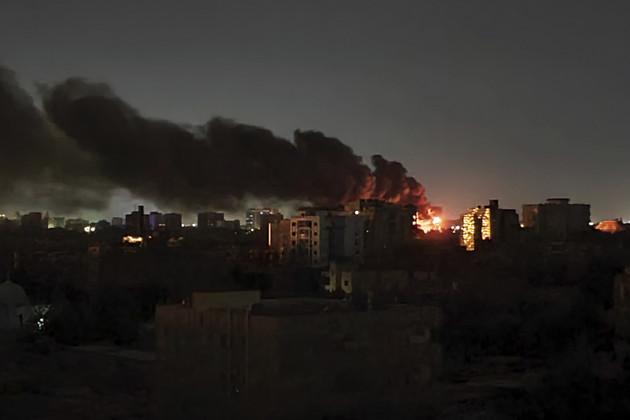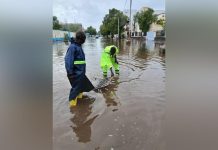Africa-Press – Djibouti. The Pentagon is positioning U.S. forces in Djibouti in anticipation of a potential mission to evacuate U.S. Embassy personnel in Khartoum, two people familiar with the military plans said.
The security situation in Sudan’s capital has cratered over a week of fighting, as two rival generals — Gen. Abdel-Fattah Burhan, in charge of the nation’s armed forces, and Gen. Mohammed Hamdan Dalago, who leads the Rapid Support Forces military group — battle for control of the country. The heavy fighting in Khartoum has left many stranded in the city of 5 million people, including embassy staff who are sheltering in place at the compound eight miles from the international airport.
Wendy Sherman, the deputy secretary of State, privately told lawmakers Wednesday that troops would be moving to Djibouti, home to Camp Lemmonier, to provide the administration an option to launch an evacuation operation, according to one of the people familiar with the situation. The person, along with others POLITICO spoke to for this story, was granted anonymity to discuss sensitive military planning and internal deliberations. Sherman stressed that the mission would whisk only embassy staff to safety and that there won’t be a military-led general evacuation of American citizens, the lawmaker added.
A Defense Department spokesperson confirmed that the U.S. was prepositioning troops, but stopped short of saying they were heading to Djibouti.
“The Department of Defense, through U.S. Africa Command, is monitoring the situation in Sudan and conducting prudent planning for various contingencies. As part of this, we are deploying additional capabilities nearby in the region for contingency purposes related to securing and potentially facilitating the departure of U.S. Embassy personnel from Sudan, if circumstances require it,” said DoD spokesperson Lt. Col. Garron Garn.
Some in the administration are hoping to avoid scenes reminiscent of the evacuation from Kabul, Afghanistan, in 2021. The crush of thousands pleading to leave the city as the Taliban took control became a defining image of America’s withdrawal.
Lawmakers, meanwhile, are worried about the safety of U.S. staffers in Khartoum.
Sen. Tim Kaine (D-Va.), a member of the Senate Foreign Relations Committee, said worried senators took a detour to a Capitol briefing Thursday on the document leaks to ask about the safety of U.S. personnel in Khartoum. Declining to provide specifics because of the classified setting, Kaine said there was a plan in place to take care of them.
“Arrangements have been made. They’re sheltering in place and currently all secure, all accounted for and in communication with them,” he said. “There’s a whole-of-government effort to figure out exactly how to make sure that they continue in safety. We’re very much on top of it.”
Sen. Mitt Romney (R-Utah), also on the committee, added “I, of course, have concerns about our personnel there.” He declined to discuss specific plans.
A military evacuation seems more likely by the hour.
The airport, located in central Khartoum, is closed but would be inoperable even if it reopened due to damage from bombardment and fighting. The roughly 70 U.S. staff at the embassy have no options to leave Sudan on their own without immense risk to their safety. For the most part, U.S. diplomats in Sudan are unaccompanied, meaning they do not have their family with them at what’s considered a challenging post, a State Department official said.
The American mission in the capital warned Thursday that “due to the uncertain security situation in Khartoum and closure of the airport, it is not currently safe to undertake a U.S. government-coordinated evacuation of private U.S. citizens.”
Also on Wednesday, Molly Phee, the top State Department official for African affairs, told congressional staffers that it was too late to order a departure of the mission because of the deteriorating security situation that has already led to around 300 deaths and about 3,000 more wounded, two congressional aides said.
Another U.S. official familiar with the planning said papers had been drawn up at the State Department for an evacuation order. The official added that State Department leadership held a call with embassy staff Thursday morning to discuss options, including a ground evacuation. But the assessment, per the official, was that travel by road was currently more dangerous than by air.
A potential option would be to move the personnel to Wadi Seidna Air Base for an air evacuation. Dozens of Egyptian soldiers captured by the Rapid Support Forces paramilitary group were released this week and flew home from that base, which is 14 miles north of Khartoum.
The United States was also in touch with other countries with embassies in the Sudanese capital about evacuation plans, a different U.S. official said.
The State Department didn’t immediately respond to a request for comment.
The Biden administration has faced similar situations multiple times since the chaotic Kabul evacuation.
As the situation deteriorated in Ethiopia amid a major conflict, the State Department urged Americans to leave the country while preparing U.S. forces and diplomats for a potential full embassy closure that ultimately did not have to happen. (A partial drawdown of non-emergency embassy personnel was ordered.)
The administration shut down the U.S. Embassy in Kyiv in the days before Russia launched a full-scale invasion of Ukraine. Within months it had reopened the embassy, though not at full staffing.
The Biden administration in both cases said it would not stage another Kabul-style evacuation that involved people beyond U.S. government employees. To that end, it sent out warnings for weeks and months telling Americans to leave Ethiopia and Ukraine.
The political situation in Sudan has been volatile for years, and the State Department has long urged Americans not to travel there. The last time a similar fight broke out in the region between two top leaders, 400,000 people died — and that was in South Sudan.
Pour plus d’informations et d’analyses sur la Djibouti, suivez Africa-Press






